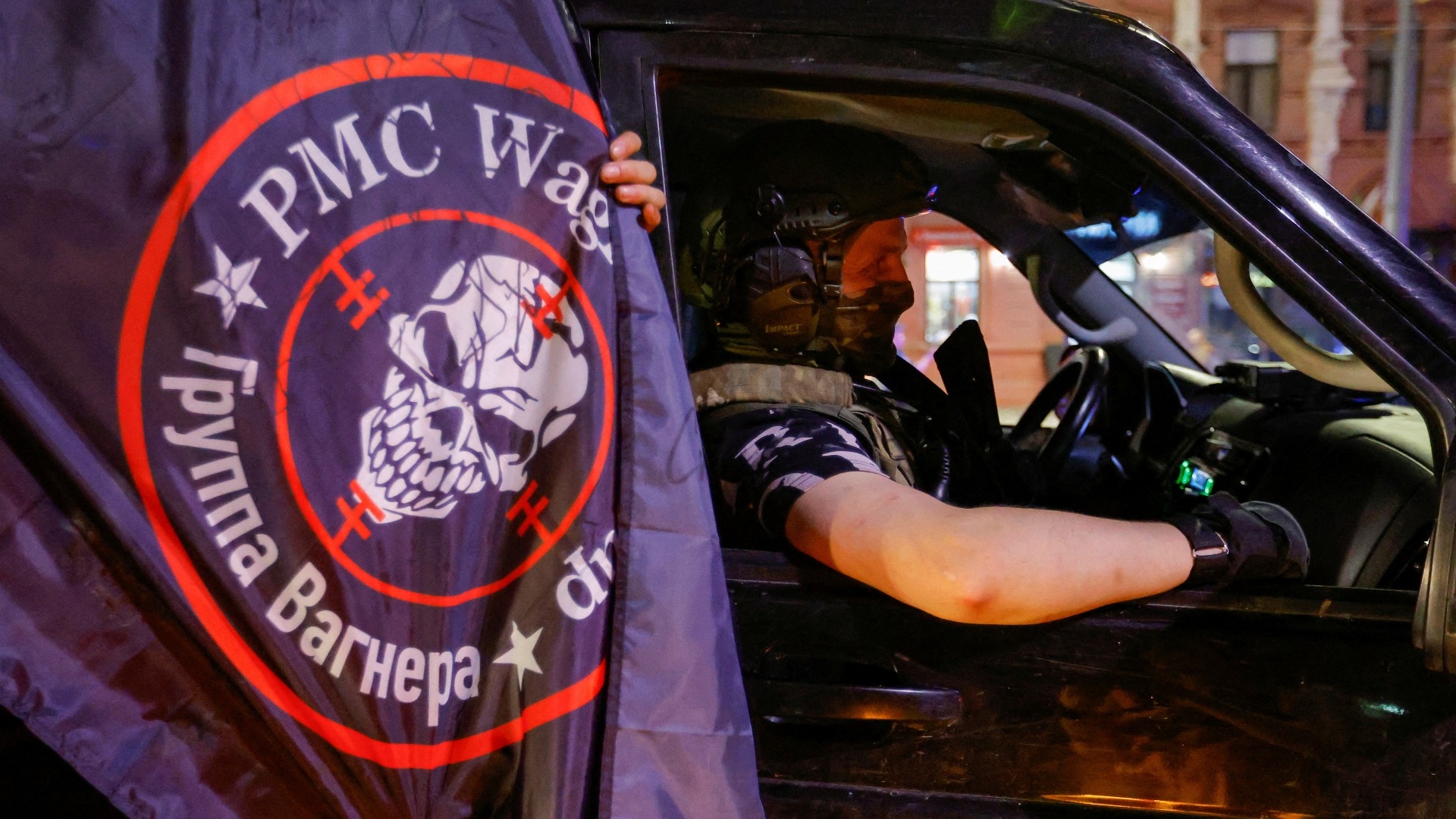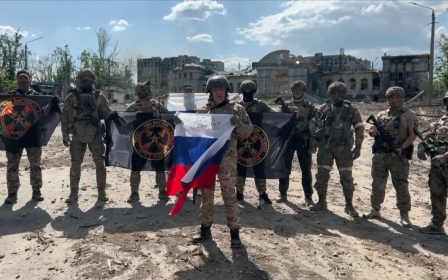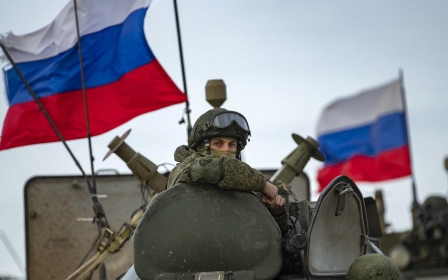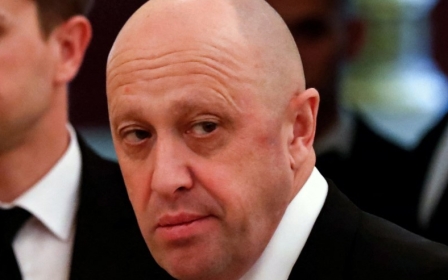Wagner: Putin struggling to take full command of organisation's forces

Two weeks after the Wagner Group’s armed rebellion against Vladimir Putin, the Russian Defence Ministry is yet to take full control of thousands of fighters and is struggling to get hold of offices and barracks even in Ukraine, amid a wave of desertions.
Three sources directly involved with the private military market, who are familiar with Wagner’s operations, told Middle East Eye that it would take at least a year for the defence ministry to get hold of the situation amid a lingering war in Ukraine that has heavily strained the Russian military, industry, and bureaucracy.
On 23 June, the Wagner Group, a private Russian paramilitary force, turned against Russia’s military leadership and began marching from Ukraine to Moscow.
The next day, with its fighters some 150km from the Russian capital, an agreement was struck that allowed Wagner’s chief Yevgeny Prigozhin to safely travel to Belarus in return for ending his mutiny.
Yet on Thursday, Belarusian President Alexander Lukashenko said Prigozhin had travelled back to St Petersburg.
New MEE newsletter: Jerusalem Dispatch
Sign up to get the latest insights and analysis on Israel-Palestine, alongside Turkey Unpacked and other MEE newsletters
Lukashenko also said the question of Wagner units relocating to Belarus had not been resolved and would depend on decisions by Russia and Wagner’s leadership.
"Whether they will be in Belarus or not, in what quantity, we will figure it out in the near future," he said.
The sources said the ministry is facing difficulties because it is simply not easy to take command of a military company that has its own market, intelligence structure, and international networks.
Furthermore, Wagner not only has large numbers of fighters in Ukraine, but thousands of troops and operatives in Syria, Libya, Sudan, Mali, the Central African Republic and elsewhere.
“The organisation naturally has become more cautious due to the friction with the Russian military command and intelligence over the Ukraine war during the past 11 months,” one source familiar with Wagner's internal dynamics told MEE.
Regularising the fighters
Sources speculated that some Russian nationalist and radical right-wing elements of Wagner have already deserted the company after Prigozhin agreed to relocate to Belarus and disband his businesses.
However, the bulk of the Wagner forces are still ready to cooperate with the Russian military because they don’t have much of a choice.
“Prigozhin started to march to Moscow with only 2,000 soldiers, the bulk of the combatant force didn’t agree with what Prigozhin tried to achieve,” the first source told MEE.
“Wagner’s offices all around the country didn’t close down and it is actively recruiting soldiers, but this time their contracts are relayed to the defence ministry.”
A second source familiar with Wagner’s internal operations said many fighters are reluctant to leave the organsiation because they have been recruited from prisons in return for amnesties, and so they will quickly switch to the defence ministry contracts.
'It is likely that Prigozhin’s moves and Wagner's dissolution will push a large number of radicals into action against Moscow'
- Source familiar with Wagner
One source estimated that 85 percent of the approximately 50,000-strong Wagner force fighting in Ukraine would switch to the defence ministry with ease.
But the first source agreed that some professionally trained fighters and Russian nationalists are now disillusioned with the whole situation.
“There are reports of nationalists who have already left company bases,” the source said.
“The desertion numbers will become clear in the coming days, as the Russian military does not control most of the company's bases.”
The first source alleged that several fighters have left their posts in Africa, such as in Libya, but declined to give an exact number.
“Some of the deserters are those who openly made anti-Putin rhetoric during Prigozhin’s uprising. Others are recruited locally,” the source said.
“It is likely that Prigozhin’s moves and Wagner's dissolution will push a large number of radicals into action against Moscow, both inside and outside of Russia, and these elements, the fugitives and the ones who went underground, will seek refuge elsewhere.”
A third source, who is directly involved in Wagner operations, said most of the people affiliated with the organisation in Libya, Mali, and Syria are likely to sign contracts with the defence ministry.
“There were desertions in Libya from the fighters recruited from Syrian areas controlled by Damascus, due to unpaid salaries and mismanagement,” the source said. “There are also recruits from third countries and their future is unclear.”
Prigozhin's future in the balance
The future of Prigozhin still hangs in the balance. The third source said Putin personally accuses Prigozhin of treason.
“Prigozhin had to sacrifice himself with the mutiny because the defence ministry was going to purge him and [merge] Wagner with a new corporation anyway,” the source said.
“Prigozhin now knows that his fate is only in Putin's hands.
"However, Putin differentiates those who are among Wagner but not participating in the rebellion, giving the company an indefinite time frame for the future.”
The source said the situation in Syria won’t change much since the Russian military base in Khmeimim will assume full control of Moscow’s operations in the country, and in central Africa, the organisation has already acknowledged the Russian defence ministry’s supremacy.
Two of the sources interviewed by MEE predicted Wagner wouldn’t disappear in a simple way and there was the possibility that Moscow might again use the group to do some dirty work on its behalf.
“There are those who say that we should keep Wagner in a coma for a while and use it as a dirty shoe for some tasks, but the priority is taking full command of Wagner forces,” the third source said.
“The Russian defence ministry needs to personally question Prigozhin to resolve this web of connections and get the hold of Wagner.
"However, as I said, you don't hesitate to step on the mud with an already dirty shoe.”
Middle East Eye delivers independent and unrivalled coverage and analysis of the Middle East, North Africa and beyond. To learn more about republishing this content and the associated fees, please fill out this form. More about MEE can be found here.





